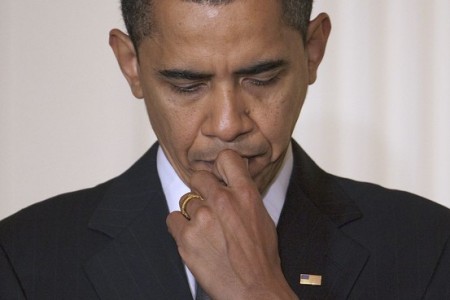Within hours of President Obama’s declaration on Friday that he will seek Congressional approval for any US military action, “senior administration officials” have gone to the media — including the Associated Press, The New York Times, The Los Angeles Times, and The Wall Street Journal — to describe a sudden change of mind by the Commander-in-Chief.
Until Friday night, the line was that adopted on the previous Saturday, August 24, three days after the Assad regime’s chemical weapons attacks near Damascus: the question was not if the US would respond, but when.
While some members of Congress signed a letter asking for no military action without their approval, no Senate or House of Representatives made that request personally to the White House. They said seeking a vote to authorize a strike was not even tabled as an option by the White House.
However, on Friday night — after a statement by Secretary of State John Kerry pointing to immediate military action and milder comments by the President — Obama told his chief of staff, Denis McDonough, that he wanted the Congressional endorsement.
The officials said Obama’s aides were “stunned” when he summoned them to the Oval Office at 7 p.m. to tell them of his new plan:
He had several reasons, he told them, including a sense of isolation after the terrible setback in the British Parliament. But the most compelling one may have been that acting alone would undercut him if in the next three years he needed Congressional authority for his next military confrontation in the Middle East, perhaps with Iran.
If he made the decision to strike Syria without Congress now, he said, would he get Congress when he really needed it?
Two advisors said that, even after the August 24 decision to prepare airstrikes, Obama had doubts about the political and legal justification, given the inability to get approval in the United Nations Security Council. Those legislators calling for a Congressional vote added to the President’s worries.
The rejection of immediate military action by the British Parliament on Thursday added to those concerns. “We similarly have a war-weary public,” Obama told aides.
So on Friday night, Obama — only a few hours after Secretary of State John Kerry had given a tough speech pointing to immediate intervention — changed course, telling his Chief of Staff of his decision and summoning his top advisors.
“I have a pretty big idea I want to test with you guys,” he said to the group: McDonough and his deputy, Rob Nabors; the National Security Advisor, Susan E. Rice, and her deputies, Antony J. Blinken and Benjamin J. Rhodes; the President’s senior advisor, Dan Pfeiffer; and several legal experts.
Some of these officials resisted, but at 9 p.m., the President drew the debate to a close.
He telephoned Kerry and Secretary of Defense Chuck Hagel: the airstrikes, for now, had been stood down.

